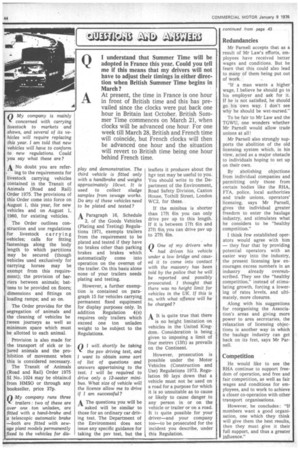Redundancies
Page 46

If you've noticed an error in this article please click here to report it so we can fix it.
Mr Parnell accepts that as a result of Mr Law's efforts, employees have received better wages and conditions. But he fears that this could also lead to many of them being put out of work.
"If a man wants a higher wage, I believe he should go to his employer and ask for it. If he is not satisfied, he should go his 'own way. I don't see why he should be wet-nursed."
To be fair to Mr Law and the TGWU, one wonders whether Mr Parnell would allow trade unions at all?
Mr Parnell also strongly supports the abolition of the old licensing, system which, in his view, acted as a major obstacle to individuals hoping to set up on their own.
By abolishing objections from individual companies and permitting only those from certain bodies like the RHA, FTA, police, local authorities and trade unions, operators' licensing, says Mr Parnell, gives the individual greater freedom to enter the haulage industry, and stimulates what he considers to be "healthy competition."
I think few established operators would agree with him — they fear that by providing potential operators with an easier way into the industry, the present licensing law encourages excess numbers in an industry already oversubscribed. They see the "healthy competition," instead of stimulating growth, forcing a lowering of rates levels, and ultimately, more closures.
Along with his suggestions for reorganising the Association's •areas and giving more power to area secretaries, the relaxation of licensing objections is another way in which the haulage industry can get back on its feet, says Mr Parnell.
Competition
He would like to see the RHA continue to support freedom of operation, and free and fair competition, as well as fair wages and conditions for employees, and to work to achieve a closer co-operation with other transport organisations.
However, he concludes : "If members want a good organisation, one which they think will give them the best results, then they must give it their full support, and thus a greater influence."




















































































